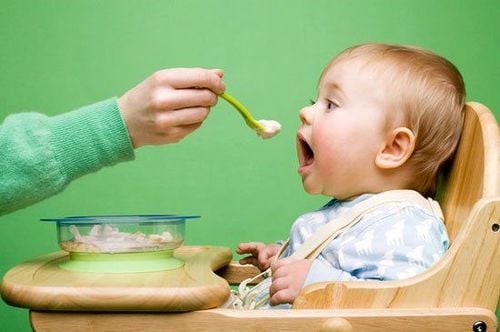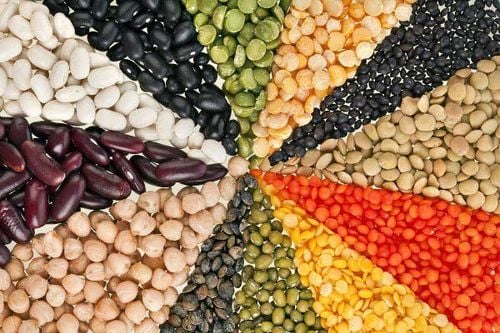This is an automatically translated article.
The article was consulted with Master, Doctor Nguyen Thi An - Pediatrician - Neonatologist - Department of Pediatrics - Neonatology - Vinmec Ha Long International General Hospital.Many parents only let their children eat bone broth, not eating anything because they think that the broth is not only easy to eat but also contains all the nutrients from the secretions.
1. Only let children eat bone broth, don't eat - should or not?
Many parents have a habit of giving their children only bone broth or just mixing bone broth with porridge and rice to feed their children. Parents believe that the nutrients in the female part will all be mixed into the bone broth, so just feeding the child the broth is enough. This is a completely wrong concept for the following reasons:No matter how long the bones are simmered, how long they are stewed, and how the cooking technique is, the broth still contains very little nutrients, only a small amount. vitamins, protein, calcium,...Calcium is an important component for the development of children, plays a role in the formation of bone and tooth structure. Although bone broth contains calcium, this is inorganic calcium, which the child's body cannot absorb. Therefore, only feeding children with stewed water can cause children to be deficient in calcium, leading to rickets, growth retardation, and malnutrition.
Protein is one of the 4 essential groups of nutrients that need to be added to a child's diet. Protein is abundant in meat, shrimp, fish, eggs, etc. No matter how long the mother cooks the bones, the protein still only dissolves in a small amount, the rest is mainly in the food residue. Therefore, the mother should feed the baby the whole "female" part of shrimp, meat, fish... to fully supplement nutrients. Bone broth contains a small amount of water-soluble vitamins, and fat-soluble vitamins such as A. ,D,E,K will not be able to dissolve into the broth. Therefore, only giving children stewed water will make them deficient in these important vitamins. Fat in the bone marrow often mixes with the broth, making the mother subjective and not adding fat to the baby. But mothers should note that fat from bone marrow is animal fat, difficult to absorb and does not bring many benefits to children. Mothers should supplement the diet with vegetable fats such as sesame oil, soybean oil, peanut oil, ... to provide more energy for the development of children. Children only eat broth or broth mixed with rice, porridge will lack fiber, causing children to have constipation, indigestion and many other intestinal diseases. chewing, but over time this will form a habit of lazy chewing, sucking on food and can lead to anorexia. The chewing function plays a very important role in the digestion of food. Chewing not only helps to reduce food, mixes food with saliva containing digestive enzymes, but also affects the jawbone system of young children. Therefore, children who are lazy to chew will lead to many consequences for digestive problems and bone structure.

Trẻ lười nhai sẽ dẫn đến nhiều hệ quả cho vấn đề tiêu hóa và cả cấu trúc xương
2. Some notes when giving solid foods to babies
Nutrition plays an important role in the physical and intellectual development of children. Therefore, parents need to build a suitable weaning diet for the comprehensive development of their children.Nutrition for children needs to contain the following four groups of nutrients: Starch (rice, noodles, corn, potatoes...); Protein (meat, fish, shrimp, crab..); Fat (edible oil); Vegetables help provide vitamins, iron, fiber and other minerals needed by the body. Children must eat both the main part and the broth to provide enough nutrients for the child. Children should be given foods from liquid to solid, from small to large amounts, and should also be used to gradually getting used to new foods. Food used for children must ensure safety and hygiene, people preparing food for children must wash their hands before preparing food to avoid causing digestive disorders and other intestinal diseases. Increase the energy of the meal by adding oil, fat or sesame, peanuts (sesame, peanuts). Fat not only helps to make the bowl of dough fragrant, fatty and soft, making it easy for children to swallow, but also provides more energy for the development of children. When feeding children, they should be encouraged and encouraged, not threatened because of psychological pressure, making them afraid to eat, afraid when it comes to meals. In addition, should not be petted, coaxed too much because it will form bad habits in children, must be rewarded to children to eat. Do not let children eat cakes, candies, or drink soft drinks before meals because sweets increase blood sugar, make children full, and lose their appetite. stew water. Children should eat enough fiber. If children do not like to eat vegetables, they should find ways to process vegetables into attractive and easy-to-eat dishes to add enough fiber for children. Besides, parents also need to supplement their children with essential micro-minerals such as zinc, lysine, chromium, selenium, vitamin B1, ... to fully meet the nutritional needs of children. The addition of these essential vitamins also supports digestion, enhances nutrient absorption, improves anorexia, and helps children eat well. Parents can simultaneously apply dietary supplements and functional foods derived from nature for easy absorption. The most important thing is that improving your baby's symptoms often takes a long time. Combining many types of functional foods at the same time or changing many types in a short time can make the baby's digestive system unable to adapt and completely not good. Therefore, parents must be really patient with their children and regularly visit the website vimec.com to update useful baby care information.
Article referenced source: National Institute of Nutrition













